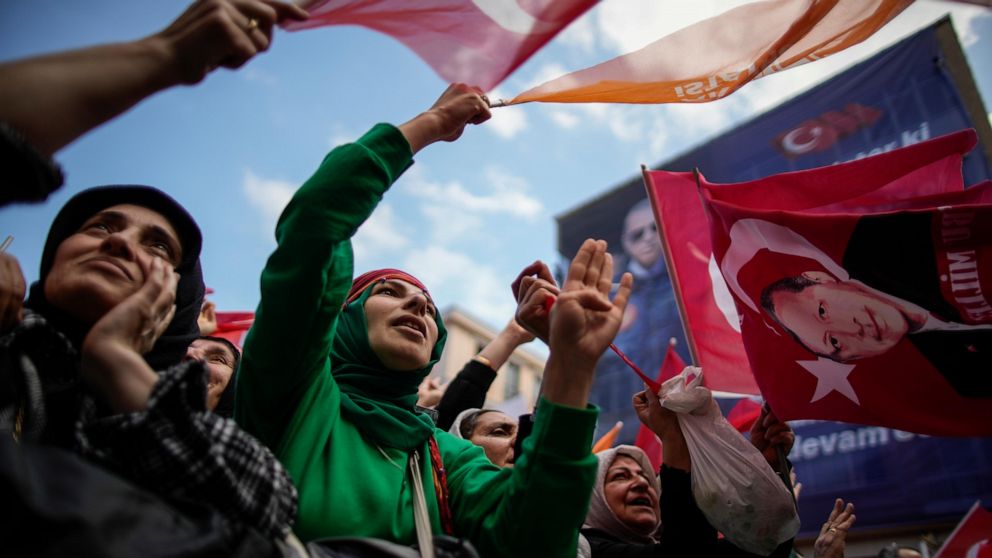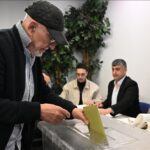Global Courant 2023-05-14 10:47:15
ANKARA, Turkey — Voters in Turkey head to the polls on Sunday in historic parliamentary and presidential elections that are expected to be heavily contested and could represent the biggest challenge facing Turkish President Recep Tayyip Erdogan in his two decades in power.
The vote will either grant the increasingly authoritarian Erdogan a new five-year term in office, or the NATO member state on what its opposition party calls a more democratic path.
The poll started at 08:00 (05:00 GMT) and will close at 17:00 (14:00 GMT). Media organizations are not allowed to report partial results until an embargo is lifted at 21:00 (1800 GMT). There are no exit polls.
For the first time in his 20 years in office, polls show populist Erdogan, 69, entering a race trailing an opponent. Opinion polls have given a slight hint to Kemal Kilicdaroglu, the 74-year-old leader of the centre-left, pro-secular Republican People’s Party, or CHP, and the joint candidate of a united opposition alliance. If neither candidate receives more than 50% of the vote, the presidential race will be decided in a second round on May 28.
More than 64 million people, including 3.4 million foreign voters, are eligible to vote in the elections, which will take place in the year that marks Turkey’s 100th anniversary of the founding of the republic. Voter turnout in Turkey has traditionally been high, demonstrating a belief in this type of civic participation in a country where freedom of expression and assembly have been suppressed.
The election comes as the country is ravaged by economic turmoil that critics blame on the government’s mishandling of the economy and a serious crisis in the cost of living.
Turkey is also reeling from the effects of a powerful earthquake that devastated 11 southern provinces in February and left more than 50,000 dead in unsafe buildings. Erdogan’s government has been criticized for its delayed and immature response to the disaster and lax implementation of building regulations that exacerbated the misery.
The election is being closely watched internationally as a test of a united opposition’s ability to dislodge a leader who has concentrated nearly all of the state’s power in his hands.
Erdogan has led a divisive election campaign, using state resources and his dominance over the media as in previous years. He has accused the opposition of collaborating with “terrorists”, of being “drunkards” and of defending LGBTQ rights, which he says threaten traditional family values.
In an effort to woo voters hit hard by inflation, he has raised wages and pensions and subsidized electricity and gas bills, while highlighting Turkey’s defense industry and homegrown infrastructure projects.
He has expanded the political alliance of his ruling Justice and Development Party, or AKP, to include two nationalist parties, including a small left-wing party and two fringe Islamist parties.
Kilicdaroglu’s six-party party, the Nation Alliance, has pledged to dismantle an executive presidential system narrowly voted down by Erdogan in 2017 and return the country to a parliamentary democracy. They have pledged to establish the independence of the judiciary and central bank, establish checks and balances, and reverse the democratic decline and crackdown on freedom of speech and dissent under Erdogan.
The alliance includes the nationalist Good Party led by former Interior Minister Meral Aksener, and two parties split from the AKP and led by former Prime Minister Ahmet Davutoglu and former Finance Minister Ali Babacan, as well as a small Islamist party.
The country’s main Kurdish political party, currently Turkey’s second largest opposition group against which the government has targeted arrests and lawsuits, is backing Kilicdaroglu in the presidential race.
Also running for president is Sinan Ogan, a former academic who has the backing of an anti-immigrant nationalist party. Another candidate, centre-left politician Muharrem Ince, dropped out of the race on Thursday after a significant drop in his ratings, but his withdrawal was deemed invalid by the country’s electoral council and the votes will be counted for him.
Voters will also vote to fill seats in the 600-member parliament. The opposition would need at least a majority to implement some of the promised democratic reforms.
Voting in the 11 quake-hit provinces has raised concerns over the registration of nearly 9 million voters.
About 3 million people have left the earthquake zone for other counties, but only 133,000 people have registered to vote for their new locations. Political parties and non-governmental organizations planned to bus voters, but it was not clear how many would make the return journey.
Many of the earthquake survivors will vote in containers converted into makeshift polling stations built in schoolyards.
___
Bilginsoy reported from Istanbul.








